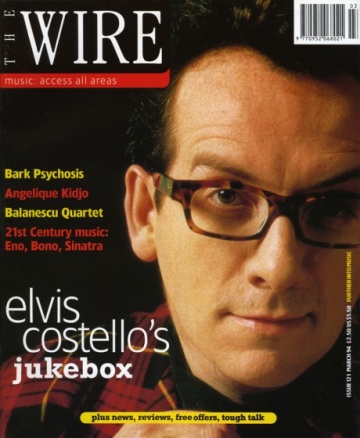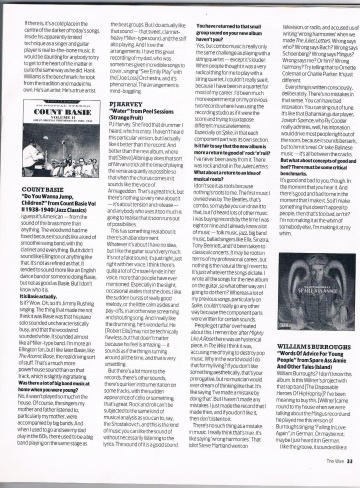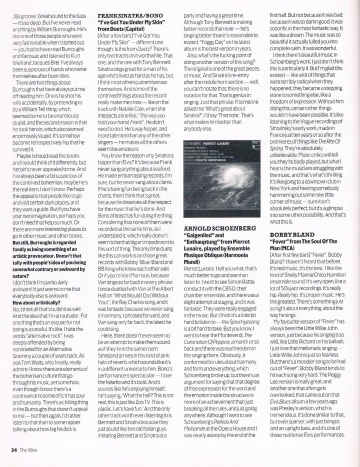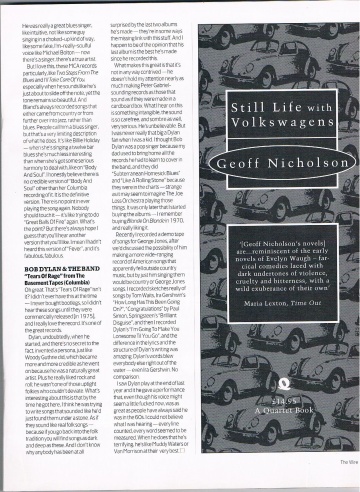The Wire, March 1994: Difference between revisions
(add external link) |
(add external link and transcribed text and tags) |
||
| Line 14: | Line 14: | ||
'''DMITRI SHOSTAKOVICH <br> | '''DMITRI SHOSTAKOVICH <br> | ||
“Allegretto” from String Quartet No 3 In F Major Op 73 played by The Brodsky Quartet (Teldec)''' | '''“Allegretto” from String Quartet No 3 In F Major Op 73 played by The Brodsky Quartet (Teldec)''' | ||
It’s the Brodskys. I haven’t listened to the record we made for a while, but it’s funny how different the timbre of the quartet sounds on that recording to when we recorded But still, it’s just like a singer – it is a voice that is instantly recognisable. | It’s the Brodskys. I haven’t listened to the record we made for a while, but it’s funny how different the timbre of the quartet sounds on that recording to when we recorded But still, it’s just like a singer – it is a voice that is instantly recognisable. | ||
| Line 31: | Line 31: | ||
'''HANK WILLIAMS'''<BR> | '''HANK WILLIAMS'''<BR> | ||
'''“I’ll Be A Bachelor ‘Til I Die” from The Wonderful World of Hank Williams 1947-1950 (SPA) | '''“I’ll Be A Bachelor ‘Til I Die” from ''The Wonderful World of Hank Williams'' 1947-1950 (SPA) | ||
[After the first bar] That’s Hank Williams. I don’t know that song, but I don’t really care so much for that kind of Hank Williams tune. That track’s much more like pop music really, isn’t it? And he was a pop star in a big way. It was instantly Hank Williams because of that scrappy fiddle sound. It’s very distinctive. And again the atmosphere of the tune is better because it’s analogue, and when it comes on there’s this sort of air just before the voice all the time. | [After the first bar] That’s Hank Williams. I don’t know that song, but I don’t really care so much for that kind of Hank Williams tune. That track’s much more like pop music really, isn’t it? And he was a pop star in a big way. It was instantly Hank Williams because of that scrappy fiddle sound. It’s very distinctive. And again the atmosphere of the tune is better because it’s analogue, and when it comes on there’s this sort of air just before the voice all the time. | ||
| Line 43: | Line 43: | ||
If there is, it’s a cold place in the centre of the darker of today’s songs. Inside his apparently limited technique as a singer and guitar player is real to-the-bone music. It would be daunting for anybody to try to get to the heart of the matter in quite the same way as he did. Hank Williams is the benchmark: he took from the tradition and made it his own. He’s an artist. He’s a true artist. | If there is, it’s a cold place in the centre of the darker of today’s songs. Inside his apparently limited technique as a singer and guitar player is real to-the-bone music. It would be daunting for anybody to try to get to the heart of the matter in quite the same way as he did. Hank Williams is the benchmark: he took from the tradition and made it his own. He’s an artist. He’s a true artist. | ||
'''COUNT BASIE'''<br> | |||
'''“Do You Wanna Jump, Children?” from ''Count Basie Vol II 1938-1940'' (Jazz Classics) | |||
I guess it’s American – from the sound of the brass more than anything. The woodwind had me foxed because it sounds like a kind of smoothie swing band, with the clarinet and everything. But it didn’t sound like Ellington or anything like that. It’s not as refined as that. It tended to sound more like an English dance band or someone doing Basie, but not as good as Basie. But I don’t know who it is. | |||
'''It Is Basie actually.'''<br> | |||
Is it? Wow. Oh, so it’s Jimmy Rushing singing. The thing that made me not think it was Basie was that his piano solo sounded uncharacteristically busy, and that the woodwind sounded white. It sounded almost like a Miller-type band. I’m more an Ellington fan, but I like later Basie, like The Atomic Basie, the real driving sort of stuff. That’s a much more powerhouse sound than on that track, which is slightly ingratiating. | |||
'''Was there a lot of big band music at home when you were young?'''<br> | |||
No, it wasn’t played so much in the house. Of course, the singers my mother and father listened to, particularly my mother, were accompanied by big bands. And when I used to go and see my dad play in the 60s, there used to be a big band playing on the same stage as the beat groups. But I do actually like that sound – that sweet, clarinet – heavy Miller-type sound, and the stiff alto playing. And I love the arrangements. I have this great recording of my dad, who was sometimes given incredible songs to cover, singing “See Emily Play” with the [Joe Loss] Orchestra, and it’s phenomenal. The arrangement is mind-boggling. | |||
'''P J HARVEY'''<br> | |||
'''“Water” from ''Peel Sessions'' (Strange Fruit''') | |||
P J Harvey. She fired that drummer I heard, which is crazy. I haven’t heard this particular version, but I actually like it better than the record. And better than the new album, where that [Steve] Albini guy does that sort of Nirvana trick all the time of playing the verse as quietly as possible so that when the chorus come in it sounds like voice of Armageddon. That’s a great trick, but there’s nothing so very new about it – it’s about tension and release – and anybody who uses it too much is going to realise that it soon runs out of possibilities. | |||
This has something real about it; there’s an abandonment. Whatever it’s about I have no idea, but I like the guitar sound very much. It’s not a fake sound; it’s just right, just right with her voice. I think there’s quite a lot of Chrissie Hynde in her voice, more than people have ever mentioned. Especially in the slight occasional asides that she does. I like the sudden bursts of really good melody, or the little calm asides and pay-offs, in an otherwise screaming and shouting song. And I really like the drumming, he’s wonderful. He [Robert Ellis] may not be technically flawless, but that doesn’t matter because his feel is amazing – it sounds as if the thing is turning around all the time, and that is very unsettling. | |||
But there’s a lot more to the records, there’s other sounds there’s quirkier instrumentation on some tracks, with the sudden appearance of cello or something, that’s great. Rock and roll can’t be subjected to the same kind of musical analysis as you can to, say, the Shostakovich, and this is the kind of music you can like the sound of without necessarily listening to the lyrics. The sound of it is a good sound. | |||
'''You have returned to that small group sound on your new album haven’t you?''' <br> | |||
Yes, but combo music is really only the same challenge as playing with a string quartet – except it’s louder. When people thought it was a very radical thing for me to play with a string quartet, I couldn’t really see it, because I have been in a quartet for most of my career. I’d been much more experimental on my previous two records where I was using the recording studio as if it were the score and trying to juxtapose different musical elements. Especially on ''Spike'', in that each component part was its own section. | |||
'''Is it fair to say that the new album is more a return to good ol ’rock’n’roll?'''<br> | |||
I’ve never been away from it. There was rock and roll in ''The Juliet Letters''. | |||
'''What about a return to an idea of musical roots?''' <br> | |||
I don’t see it as roots because nothing’s roots to me. The first music I owned was by The Beatles, that’s combo, so maybe you can draw it to that, but I’d heard lots of other music. I was buying records by the time I was eight or nine and I already knew a lot of music – folk music, jazz, big band music, ballad singers like Ella, Sinatra, Tony Bennett, and I’d been taken to classical concerts. It may be roots in terms of my professional career, but nothing is the natural thing I revert to. It’s just whatever the songs dictate. I wrote all the songs for the new album on the guitar, so what other way am I going to do them? Whereas a lot of my previous songs, particularly on ''Spike'', couldn’t really go any other way because the component parts where written for certain sounds. | |||
People get rather overheated about this. I remember after ''Mighty Like A Rose'' there was an hysterical piece, in ''The Wire'' I think it was, accusing me of trying to destroy pop music. Why in the world would I do that for a living? If you don’t like something aesthetically, that’s your prerogative, but no musician would ever dream of thinking like that. It’s like saying ‘I’ve made a mistake by doing that’. But I haven’t made any mistakes. I just made th record that I made then, and if you don’t like it, then don’t listen to it. | |||
There’s no such thing as a mistake in music. I really think that’s true. It’s like saying ‘wrong harmonies’. That idiot Steve Martland went on television, or radio, and accused us of writing ‘wrong harmonies’ when we made ''The Juliet Letters''. Wrong says who? Wrong says Bach? Wrong says Schoenberg? Wrong says Mingus? Wrong says me? Or him? Wrong harmony? Try telling that to Ornette Coleman or Charlie Parker. It’s just different. | |||
Everything is written consciously, deliberately. There’s no mistake in that sense. You can have bad intonation. You can sing out of tune. It’s like that Bahamian guitar player, Joseph Spence, who Ry Cooder really admires, well, his intonation would drive most people right out of the room, because is sounds beserk, but to him it’s real. Or take Balinese music – it’s all between the cracks. | |||
'''But what about concepts of good and bad? There must be some critical benchmarks.'''<br> | |||
It’s good and bad to you, though. In the moment that you hear it. And there’s good and bad to me in the moment that I make it. So if I make something that doesn't appeal to people, then that’s too bad, isn’t it? I’m not making it at the whim of somebody else. I’m making it at my whim. | |||
'''WILLIAM S. BURROUGHS'''<br> | |||
'''“Words Of Advice For Young People” from ''Spare Ass Annie And Other Tales'' (Island)''' | |||
William Burroughs? I don’t know this album. Is this Willner’s project with that rap band [The Disposable Heroes Of HipHoprisy]? I’ve been meaning to buy this. [Willner] came round to my house when we were talking about the Mingus record and he played me this version of Burroughs singing “Falling in Love Again”, in German. Or maybe not; maybe I just heard it in German. | |||
I like the groove, it sounded like a | |||
{{cx}} | {{cx}} | ||
| Line 50: | Line 92: | ||
{{tags}}[[Ross MacManus]] {{-}} [[Nick Lowe]] {{-}} [[My Aim Is True]] {{-}} [[Get Happy!!]] {{-}} [[Almost Blue]] {{-}} [[Billy Sherrill]] {{-}} [[Imperial Bedroom]] {{-}} [[Spike]] {{-}} [[Chrissie Hynde]] {{-}} [[Marc Ribot]] {{-}} [[The Dirty Dozen Brass Band]] {{-}} [[The Brodsky Quartet]] {{-}} [[The Juliet Letters]] {{-}} [[The Specials]] {{-}} [[The Pogues]] {{-}} [[George Jones]] {{-}} [[Johnny Cash]] {{-}} [[Chet Baker]] {{-}} [[Hal Willner]] {{-}} [[Weird Nightmare]] {{-}} [[Brutal Youth]] {{-}} [[Blood & Chocolate]] {{-}} [[The Attractions]] {{-}} [[Hank Williams]] {{-}} [[Billie Holiday]] | {{tags}}[[Ross MacManus]] {{-}} [[Nick Lowe]] {{-}} [[My Aim Is True]] {{-}} [[Get Happy!!]] {{-}} [[Almost Blue]] {{-}} [[Billy Sherrill]] {{-}} [[Imperial Bedroom]] {{-}} [[Spike]] {{-}} [[Chrissie Hynde]] {{-}} [[Marc Ribot]] {{-}} [[The Dirty Dozen Brass Band]] {{-}} [[The Brodsky Quartet]] {{-}} [[The Juliet Letters]] {{-}} [[The Specials]] {{-}} [[The Pogues]] {{-}} [[George Jones]] {{-}} [[Johnny Cash]] {{-}} [[Chet Baker]] {{-}} [[Hal Willner]] {{-}} [[Weird Nightmare]] {{-}} [[Brutal Youth]] {{-}} [[Blood & Chocolate]] {{-}} [[The Attractions]] {{-}} [[Hank Williams]] {{-}} [[Billie Holiday]] {{-}} [[Count Basie]] {{-}} [[Duke Ellington]] {{-}} [[Joe Loss Orchestra]] {{-}} [[The Beatles]] {{-}} [[Ella Fitzgerald]] {{-}} [[Frank Sinatra]] {{-}} [[Tony Bennett]] {{-}} [[Mighty Like A Rose]] {{-}} [[Charles Mingus]] {{-}} [[Charlie Parker]] {{-}} [[Ry Cooder]] {{-}} | ||
{{cx}} | {{cx}} | ||
Revision as of 21:20, 17 January 2024
|




